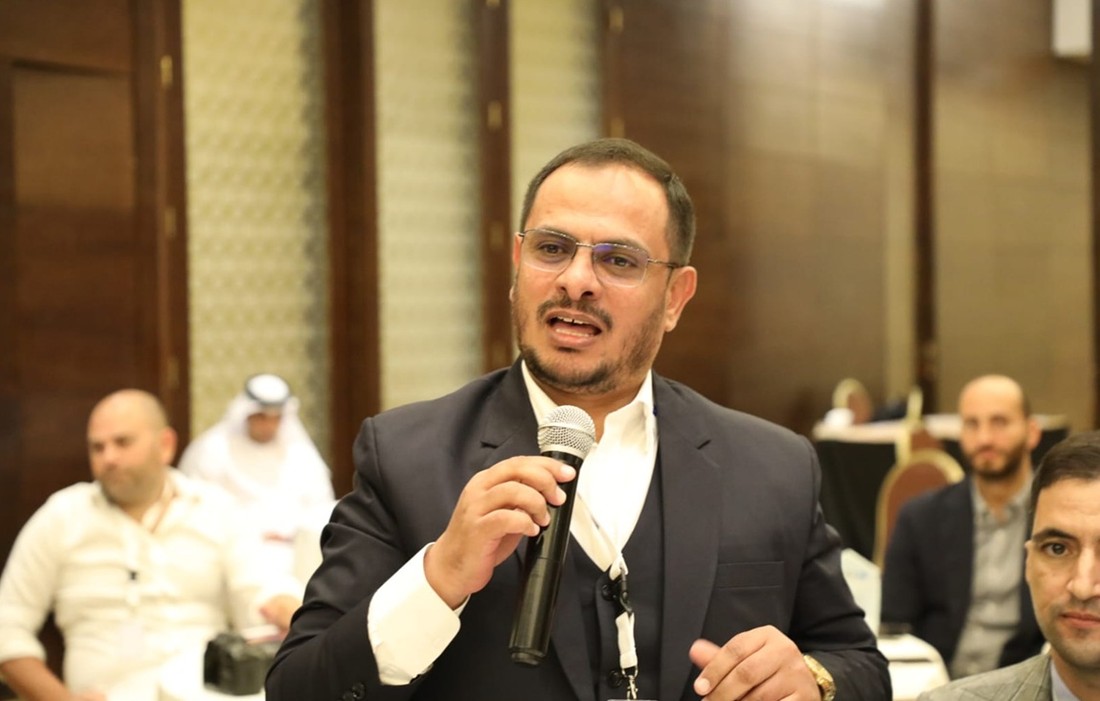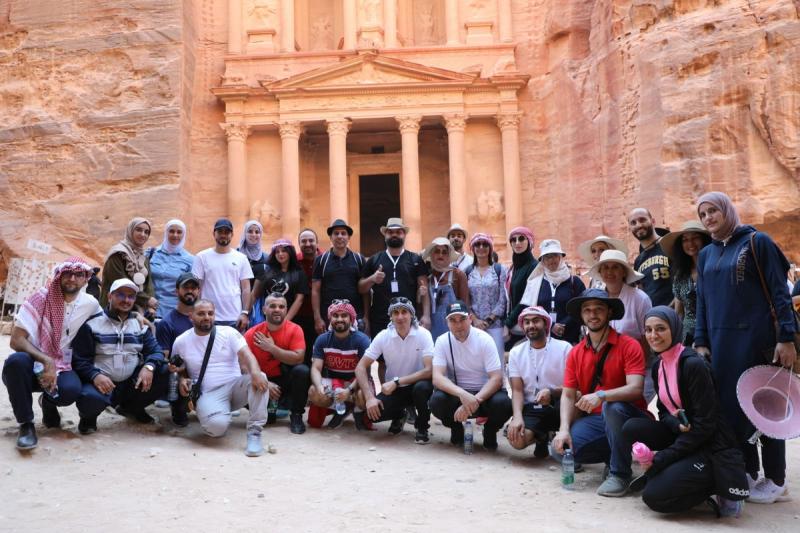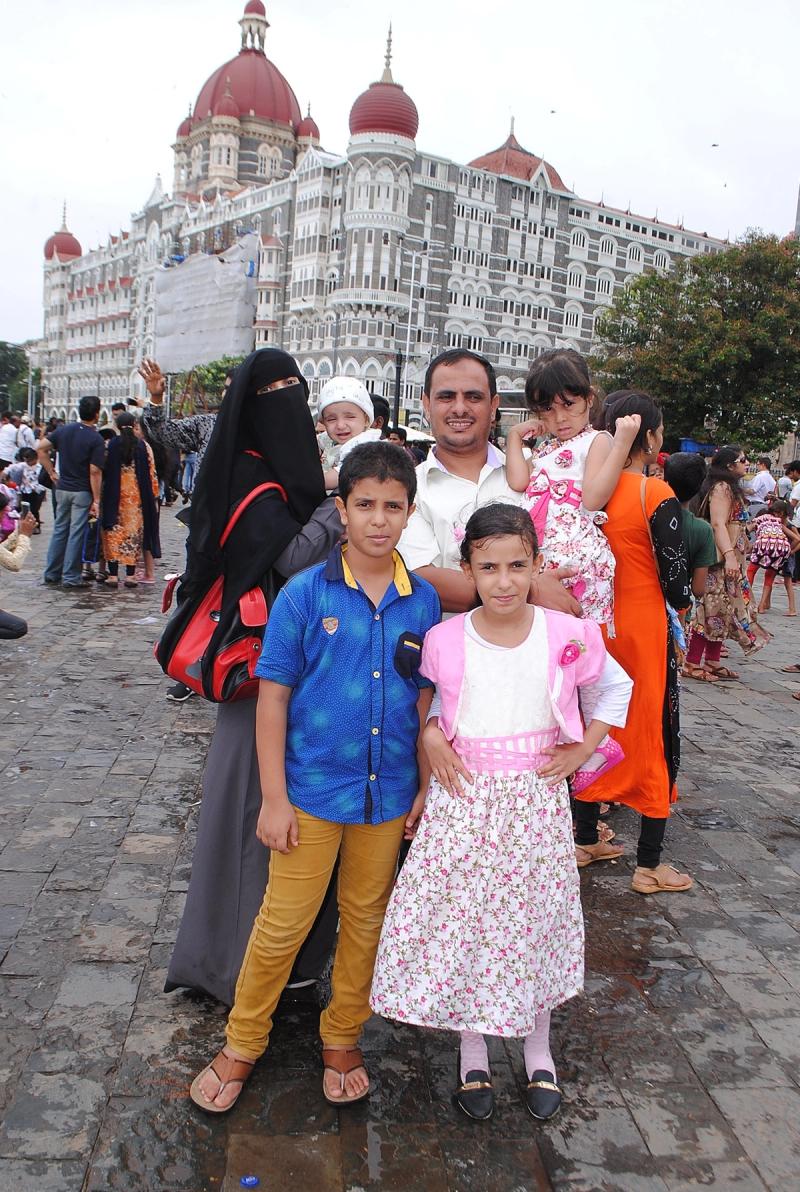The Wound and the Window: My Journey from Yemen to the World Stage

A Columbia Global Emerging Scholar on how displacement uprooted his life, and what it meant to share his story and culture at Columbia Global Center Amman.
Some nights, I still wake to the sound of shells that aren't falling. Exile plays these tricks on you—phantom pains from a homeland that exists now mainly in memory. The war that drove me from Yemen wasn't mine to choose, yet here I am, carrying its weight across continents, through lecture halls where I speak of things most would rather not hear.
My students in Yemen once asked why I taught literature in a country coming apart. What use were books when buildings were falling? I told them stories survive when cities don't. I didn't know then how soon I would become living proof of my own lesson.
Before displacement rewrote my story, I had certainties: a PhD in Comparative Literature, an MA in Political Science, a permanent teaching position at Amran University. The future had shape and substance. Now, as a non-resident postdoctoral fellow with Georgetown's MESA Global Academy and remote editor for an Amman news outlet, I've learned that academic life can continue even when everything else stops. Knowledge travels light. It crosses borders without papers.
A Room of One's Own, Finally
The Columbia Global Center in Amman welcomed me in 2023 as a Columbia Global Emerging Scholar when welcome was a scarce commodity for Yemenis. Under the mentorship of Muhsin Al-Musawi, a Columbia University professor of classical and modern literature, I found not just funding but something rarer—intellectual shelter. My research on Gulf culture and identity formation wasn’t just academic anymore; it became my way back to myself.
I remember a tour organized by the Center following a conference in Amman. Among the participants, mostly from Europe and the United States, I noticed limited awareness about Yemen and the wider region. Many held simplified views—Yemen often reduced to its conflict, the Gulf States primarily associated with oil wealth. What struck me wasn't any ill intent, but rather the gap between lived experience and academic understanding that can sometimes persist even among thoughtful scholars.

This experience highlighted why Columbia's fellowship was so meaningful. It created spaces where scholars from regions often studied but rarely heard from could contribute their perspectives and deepen the conversation. When I shared stories of Yemeni culture and hospitality—like when a Yemeni restaurant owner in Wadi Rum refused payment when he learned of my nationality—I saw how these small moments of cultural exchange could challenge preconceptions and build bridges of understanding.
Teaching From the Wound
"Your scars can be textbooks if you let them," a Syrian colleague told me before we co-taught our course on imprisonment in Arabic fiction at The New School this spring.
The class filled quickly—becoming, as the Director mentioned, one of the most registered online courses at the school. But what struck me most profoundly wasn't the enrollment numbers. It was discovering the shared thread of suffering that runs across Arab societies under authoritarian regimes, vividly captured in these fictional works.
As we explored literature from Egypt, Syria, Iraq, and Morocco, a disturbing pattern emerged: the brutal tactics of imprisonment—systematic torture, enforced disappearance, silencing of dissent—were strikingly similar across different countries. These narratives weren't merely creative expressions; they were literary documents of collective trauma, exposing how oppressive regimes fear the free word more than any weapon.
Working alongside a Syrian scholar who had himself been an academic prisoner deepened our exploration. Together, we broadened the course to include works from Libya, Saudi Arabia, Kuwait, Palestine, Algeria, Yemen, Sudan, and Lebanon. Through these texts, a dark but undeniable unity came into focus: a shared language not just of culture, but of pain, fear, and endurance across artificially divided Arab borders.
The Scholar as Witness
Today, my calendar fills with lectures at universities across North America and Europe. I speak at Georgetown, NYU, Pittsburgh. Soon I'll stand at podiums at the London School of Economics and the University of Toronto. I've become an academic itinerant, carrying Yemen with me to places where it might otherwise be forgotten.
The irony doesn't escape me: displacement has given my work a reach it might never have had otherwise. Yet each visa application, each airport questioning, each explanation of why I cannot go home reminds me of the cost.
Displacement is not just about geography; it is about memory, loss, and inheritance. My children, born or raised in exile, belong to a homeland they've never known—a place that exists for them only through stories, pain, and photos. They carry a legacy of longing they did not choose. How do you explain "home" to a child who has never touched its soil but bears its scars?

I've learned to make my scholarship a form of homing. When I write about cultural identity in the Middle East, when I prepare my upcoming podcast series on Yemeni anthropology, when I document the shifting boundaries of Gulf societies—I am laying down breadcrumbs that may someday lead back to what matters.
Exile has been my wound, yes. But also my window. Through it, I've glimpsed how stories survive when nations falter, how truth persists when politics fail. And in this glimpsing lies a kind of hope I never expected to find so far from home.
Dr. Mansour Al-Maswari was a Columbia Global Mellon Fellow in 2023. This profile is part of "Global Voices: Scholars Transforming Boundaries," a series highlighting the journeys and impacts of alumni from the Columbia Global Emerging Scholar Program.
Support for the Columbia Global Emerging Scholar program is provided by the Mellon Foundation.